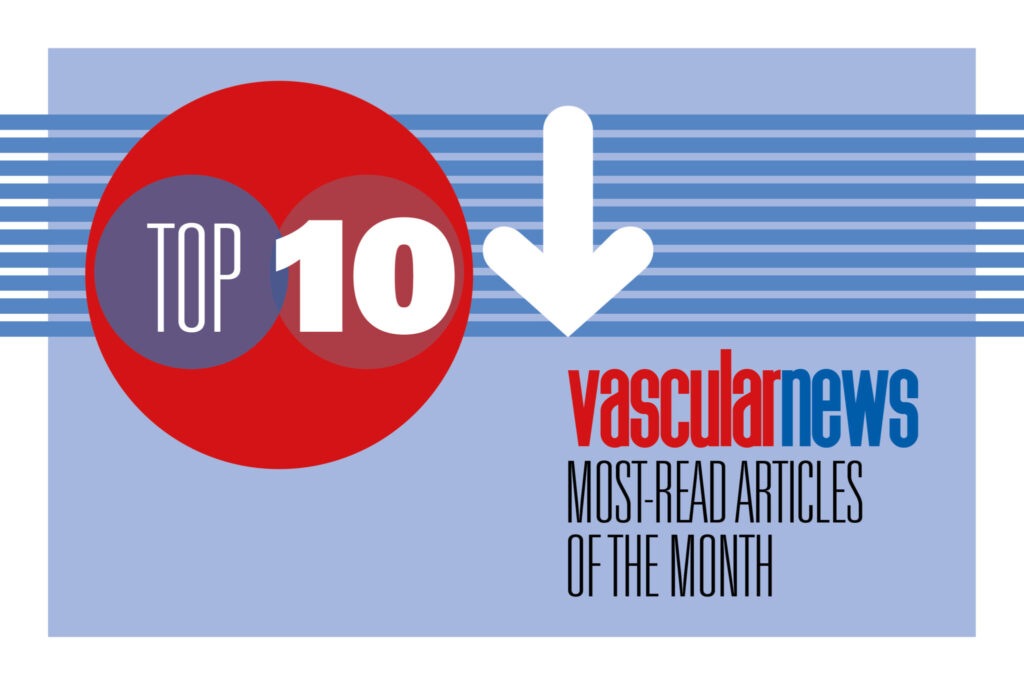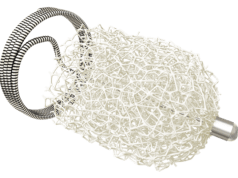 Highlights from this year’s Society for Vascular Surgery (SVS) Vascular Annual Meeting (VAM 2023; 14–17 June, National Harbor, USA) feature prominently in June’s top 10.
Highlights from this year’s Society for Vascular Surgery (SVS) Vascular Annual Meeting (VAM 2023; 14–17 June, National Harbor, USA) feature prominently in June’s top 10.
1. “Sonolysis is back” after safely reducing endarterectomy stroke risk in randomised trial
Positive results from a clinical trial involving a novel therapeutic procedure known as sonolysis—deployed during a carotid endarterectomy (CEA)—were presented at the recent European Stroke Organisation Conference (ESOC; 24–26 May, Munich, Germany).
2. Two-year DETOUR2 study results presented at VAM 2023
Endologix has announced the 24-month results of the DETOUR2 study, presented at this year’s Society for Vascular Surgery (SVS) Vascular Annual Meeting (VAM 2023; 14–17 June, National Harbor, USA) by one of the study’s principal investigators, Sean Lyden (Cleveland Clinic, Cleveland, USA).
The principal investigators behind the BEST-CLI trial struck a conciliatory tone during the inaugural Frank J Veith Distinguished Lecture at this year’s Society for Vascular Surgery (SVS) Vascular Annual Meeting (VAM 2023; 14–17 June, National Harbor, USA) in which they laid bare the blood, sweat and tears shed on their journey to complete the landmark study.
4. Novel drug candidate for slowing AAA growth demonstrates safety in humans
The local delivery of a glucose-derived compound in small- and medium-sized abdominal aortic aneurysms (AAAs) has been deemed safe, with “promising” early efficacy data indicating its potential in stabilising or slowing AAA sac growth. According to Stephen Cheng (University of Hong Kong), these first-in-human study findings—which he presented at this year’s Society for Vascular Surgery (SVS) Vascular Annual Meeting (VAM 2023; 14–17 June, National Harbor, USA)—merit further evaluations within randomised controlled trials.
The Connect The World Session: Japan at this year’s Leipzig Interventional Course (LINC 2023, 6–9 June, Leipzig, Germany)—in collaboration with the Japanese Endovascular Treatment Conference (JET)—sparked discussion surrounding the latest data in femoropopliteal interventions. Giving platform to multiple first-time data releases, the LINC 2023 audience were presented with awaited updates from global trials.
6. Significant life and limb gains for claudicants who stop smoking before lower-extremity bypass
Long-term overall survival (OS) and amputation-free survival (AFS) are outcomes that rebound in claudicants who quit smoking prior to elective surgery—and they mirror those of never smokers. But patients who do not kick the habit have significantly worse outcomes, lighting up the question: should stubbing out for good be “a requirement” before intervention?
7. US FDA approves Endologix’s Detour system for treating complex PAD
Endologix has announced in a press release that the US Food and Drug Administration (FDA) has granted approval for the Detour system to treat patients with complex peripheral arterial disease (PAD).
8. Endospan announces initial experience with the custom-made Nexus Duo aortic arch stent graft system
Endospan has announced the initial experience with its custom-made Nexus Duo aortic arch stent graft system. Theodosios Bisdas (Athens Medical Centre, Athens, Greece) presented the multicentre European experience of the first ten patients treated with Nexus Duo at this year’s Leipzig Interventional Course (LINC 2023; 6–9 June, Leipzig, Germany).
9. First-time data releases at LINC 2023 “confirm” Roadsaver carotid stent safety and efficacy
Presenting first-time data from large multicentre European studies at this year’s Leipzig Interventional Course (LINC 2023; 6–9 June, Leipzig, Germany), Arne Schwindt (St Franziskus Hospital Münster, Münster, Germany) and Ralf Langhoff (Sankt Gertrauden Hospital, Berlin, Germany) delivered results that “confirm” the safety and efficacy of the Roadsaver (Terumo) dual-layer micromesh carotid stent (DLMS).
10. The Aperto® drug-coated balloon: A “first-line” treatment for arteriovenous fistula lesions
This advertorial is sponsored by Cardionovum®.
In 2023, there are a number of different options available for treating the vascular access complications of thrombosis and stenosis, Matteo Tozzi (University of Insubria, Varese, Italy) tells Vascular News. He highlights that perhaps the most useful option of all—with “fantastic outcomes” for patients—is the Aperto drug-coated balloon (DCB; Cardionovum), and considers this to be a “first-line” treatment for intimal hyperplasia in patients with an arteriovenous fistula (AVF).













